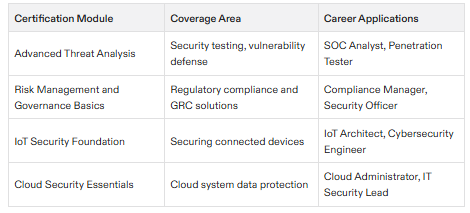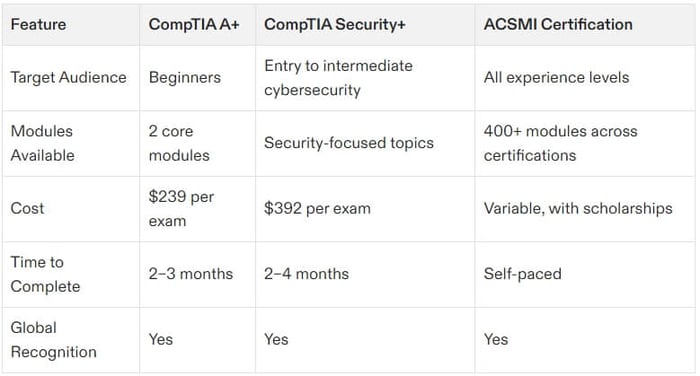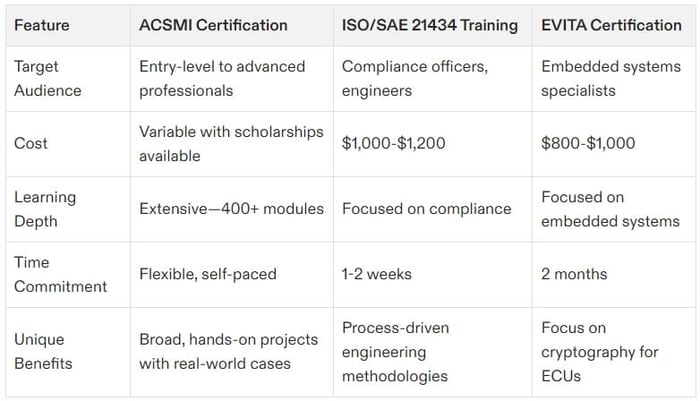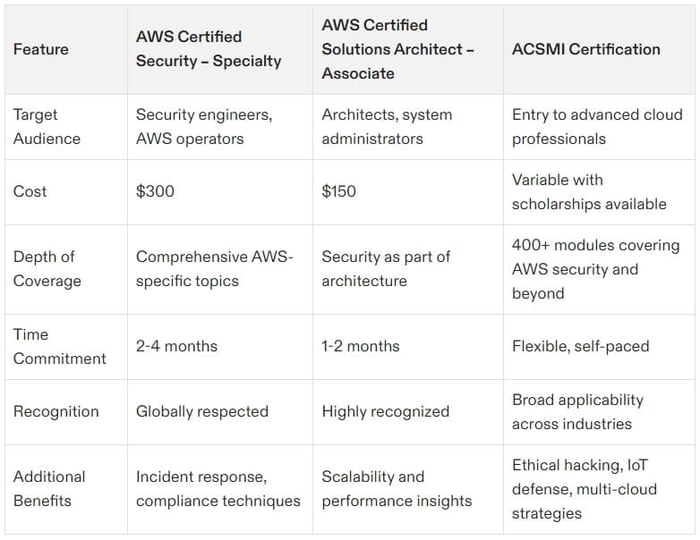Table of Contents
Navigating the fast-evolving field of cybersecurity can be daunting, especially when confronted with a wide array of certifications. Certifications validate your expertise and serve as a gateway to better opportunities, higher salaries, and credibility within the cybersecurity community. Whether you’re new to the field or a seasoned professional, understanding the right cybersecurity certification names can make all the difference in gaining a competitive edge.
Why Do Cybersecurity Certification Names Matter?
1. Employer Recognition
Cybersecurity employers prioritize certifications that are widely recognized, such as CISSP or CEH. Holding well-known credentials proves that you have the skills and knowledge expected of professionals in your role.
2. Career Advancement
Certifications are often prerequisites for managerial or advanced technical positions. For instance, positions like Chief Information Security Officer (CISO) often require certifications like CISM.
3. Specialized Knowledge
Each certification represents specialized skills. Are you looking to excel in ethical hacking, securing cloud assets, or governance? By identifying the right cybersecurity certification names, you can focus your efforts on expertise that aligns with specific roles.
Categories of Cybersecurity Certification Names
1. Entry-Level Certifications
Ideal for beginners, these certifications lay the foundation of cybersecurity concepts.
Examples of entry-level cybersecurity certification names include:
- CompTIA Security+ – Covers basic cybersecurity frameworks and concepts like network security and cryptography.
- Certified Cybersecurity Technician (CCT) – A stepping stone into more advanced technical roles.
- CCNA CyberOps Associate – Focuses on Cisco systems and addresses general cyber defense principles.
These certifications are perfect for professionals transitioning into cybersecurity from other IT roles.
2. Intermediate Certifications
Once you have a foundational understanding, intermediate certifications allow you to specialize.
Examples of intermediate certifications include:
- Certified Ethical Hacker (CEH) – Geared towards penetration testing and ethical hacking techniques.
- CompTIA CySA+ – A certification focusing on threat detection and response through data analysis.
- SSCP (Systems Security Certified Practitioner) – Acts as a bridge between technical operation roles and more advanced leadership certifications.
3. Advanced Certifications
Advanced certifications are ideal for professionals who want to move into leadership or highly specialized roles. For example:
- CISSP (Certified Information Systems Security Professional) – Focuses on security management, risk assessment, and governance.
- CISM (Certified Information Security Manager) – Tailored for leadership roles like Information Security Manager or Security Consultant.
- OSCP (Offensive Security Certified Professional) – Concentrates on offensive security skills like penetration testing and exploiting vulnerabilities.
4. Emerging Technology Certifications
Certifications focusing on new technological challenges are increasingly valued in industry. Some key certifications include:
- AWS Certified Security Specialty – For securing cloud-based systems.
- IoT Security Practitioner – Aimed at securing IoT environments.
- Certified AI Security Specialist – Focuses on AI threats in cybersecurity.
Explore the full list of certifications and training resources tailored to industry needs at ACSMI.
Selecting the Right Cybersecurity Certification Names for Your Career
Choosing the right certification can define your career trajectory in cybersecurity. With so many options available, it’s essential to have a clear strategy. Here’s a step-by-step guide to help you align certifications with your career goals and evolving market demands while incorporating hands-on experience for maximum impact.
1. Identify Your Career Path
Before jumping into certifications, take time to reflect on your long-term career aspirations. Are you passionate about ethical hacking, aiming to secure cloud infrastructures, or inclined toward leadership and governance roles?
Once you zero in on your interest, match it with relevant certifications to build a targeted skill set.
- For ethical hacking, certifications like Certified Ethical Hacker (CEH) and Offensive Security Certified Professional (OSCP) should top your list.
- If governance and compliance are your focus, consider credentials like Certified in Risk and Information Systems Control (CRISC) or Certified Information Security Manager (CISM) to prepare for management-level roles.
- Aspiring cloud security professionals should explore trending certifications such as Microsoft Azure Security Engineer Associate or AWS Certified Security Specialty to meet industry demands.
By clarifying your career path, you can prioritize the certifications that bring clear value to your ambitions.
2. Stay Ahead of Market Trends
The cybersecurity landscape changes rapidly as new technologies and threats emerge. Align your certification goals with current industry needs by analyzing market trends and job posts for in-demand qualifications.
For example, cloud security is a booming field as organizations increasingly adopt cloud-first strategies. Equipping yourself with certifications like Google Professional Cloud Security Engineer or CompTIA Cloud+ can significantly boost your employability.
Likewise, specializations like the Internet of Things (IoT) or Artificial Intelligence (AI) security are growing due to advancements in connected devices and machine learning. Certifications such as IoT Security Practitioner can position you as a niche expert in these cutting-edge domains.
Keeping up with market trends ensures that your credentials remain relevant and valuable.
3. Pair Certifications with Practical Training
Earning certifications is just one part of the equation—practical knowledge is just as crucial. While certifications validate your theoretical understanding, hands-on experience ensures you can apply what you’ve learned in real-world scenarios.
Leverage training platforms like ACSMI, which offers over 400 cybersecurity modules to help you develop actionable skills. These modules cover topics like penetration testing, risk management, and cloud security to complement popular certifications such as CEH, CISSP, or AWS Security Specialty.
By integrating learning with hands-on labs and role-based simulations, you build confidence, enhance problem-solving abilities, and prove your capabilities in actual cybersecurity environments. This combination makes you stand out in competitive recruitment processes.
Key Takeaway
Selecting the right cybersecurity certification names involves strategic planning. Align your certifications to your career path, adapt to changing market demands, and invest in quality training to strengthen your expertise. By taking a targeted approach, you’ll not only achieve your certification goals but also ensure meaningful career growth in the rapidly advancing cybersecurity field.
The Importance of Certification Renewal
Certifications like CISSP require regular renewal to keep up with continuous advancements in cybersecurity. Staying current proves your skills remain sharp and relevant to the industry. Ensure you allocate time to earn Continuing Professional Education (CPE) credits or retake exams depending on the certification’s requirements.
Stay continuously certified with ACSMI resources designed for skill refreshers.
ACSMI Modules
FAQs About Cybersecurity Certification Names
1. Which are the most valuable cybersecurity certifications?
Certifications like CISSP, CEH, and AWS Certified Security Specialty are highly valued as they address in-demand topics like security governance, ethical hacking, and cloud security.
2. Can entry-level certifications guarantee a job?
While not a guarantee, entry-level certifications like CompTIA Security+ or CCT increase your chances by validating foundational knowledge, making you stand out in applicant pools.
3. How do I choose between technical and management certifications?
Your career goals should dictate this choice. If you’re yearning for roles like penetration tester, opt for technical certifications. For leadership, governance, or compliance roles, focus on credentials like CISM or CRISC.
4. Do certifications expire?
Yes, most certifications have validity periods (e.g., CISSP requires renewal every three years). Renewal ensures that certificate holders stay updated with modern tools, technologies, and methodologies.
5. Are ACSMI modules sufficient for certification preparation?
ACSMI offers over 400 specialized modules that combine theoretical learning with hands-on labs, ensuring comprehensive preparation for certifications like CISSP, CEH, AWS Certified Security Specialty, and more.
Final Thoughts
Understanding and selecting the right cybersecurity certification names paves the way for long-term career success. With each certification representing different expertise levels, domains, and emerging trends, creating a strategic roadmap is crucial.
Support your certification goals with advanced hands-on training from ACSMI’s specialized modules and align yourself with the top minds in cybersecurity. The time to lead the industry is now—equip yourself with the right certifications to rise above the competition!





